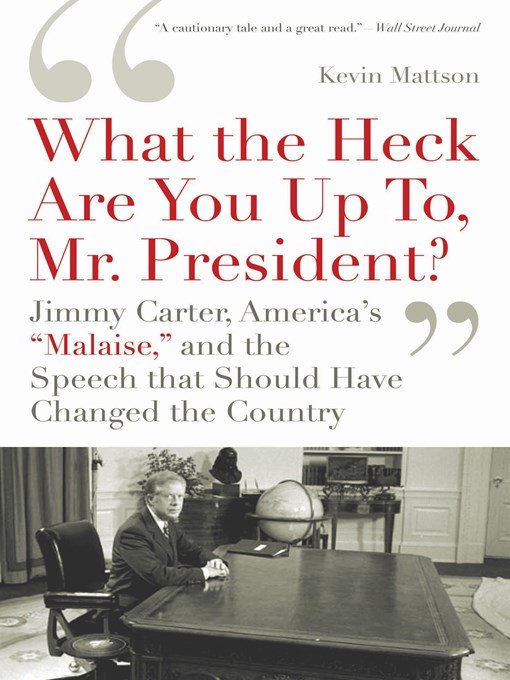
What the Heck Are You Up To, Mr. President?'
Jimmy Carter, America's 'Malaise,' and the Speech That Should Have Changed the Country
کتاب های مرتبط
- اطلاعات
- نقد و بررسی
- دیدگاه کاربران
نقد و بررسی

May 18, 2009
The 1979 “national malaise” speech that defined Jimmy Carter’s presidency—though he never used the word “malaise”—gets its due in this contrarian homage. Ohio University historian Mattson (When America Was Great
) considers the speech—which expressed Carter’s own crisis of confidence, bemoaned Americans’ loss of faith in government and deplored the country’s selfishness and consumerism—to be a thoughtful response to the problems of the day that initially won public acclaim, before political opponents caricatured it as a gloomy scolding. Following the speech from its bizarre provenance in an apocalyptic memo by pollster Pat Cadell through its honing during a messianic “domestic summit,” the author sets his colorful study against a recap of the gasoline shortages, inflation and Me Decade angst that provoked it. He interprets it as a tantalizing road not taken: with its prescient focus on energy, limits and sacrifice, its “humility and honesty,” it was, the author says, the antithesis of the Reagan era’s sunny optimism. Mattson makes Carter’s maligned speech a touchstone for a rich retrospective and backhanded appreciation of the soul-searching ’70s.

May 15, 2009
Mattson (Contemporary History/Ohio Univ.; Rebels All!: A Short History of the Conservative Mind in Postwar America, 2008, etc.) presents a bright snapshot of a nation in flux.
The election of squeaky-clean Jimmy Carter in 1976 was in part a reflection of America's desire to shed the overwhelming feelings of distrust and negativity that surrounded Watergate and Vietnam. In his inaugural address, the president humbly asserted that even if we couldn't solve all of the country's problems, at least,"in a spirit of individual sacrifice for the common good, we must simply do our best." But by the summer of 1979, the country seemed to be imploding in the face of a gas crisis, resulting in long lines at the pump, trucker strikes and violence. The nation's confidence plummeted and calls for"inspirational and innovative leadership" remained unheeded. Starting on July 4, Carter holed up at Camp David for ten days, emerging with a legendary address—delivered on national television on the evening of July 15—that would both galvanize and deeply cleave the country. Mattson, who takes his title from a July 5 headline in the New York Post, sifts through the varied media coverage of the event to isolate this crucial moment in America's recognition of itself. In Carter's speech—largely engineered by speechwriter Hendrik Hertzberg—the president warned about a moral crisis affecting the United States, acknowledging the"wounds" of the past and the loss of faith in public institutions. He also enumerated action for the energy crisis and how the country could work together to pull out of it. Yet despite the outpouring of support for the speech, the forces of the GOP's Moral Majority—especially Ronald Reagan—were gathering strength against Carter. Mattson fully renders the motley array of Carter's"Georgia Mafia," along with countless details of this turbulent era in American history.
A galloping history full of interesting characters and significant moments.
(COPYRIGHT (2009) KIRKUS REVIEWS/NIELSEN BUSINESS MEDIA, INC. ALL RIGHTS RESERVED.)

June 15, 2009
Mattson (contemporary history, Ohio Univ.; "Rebels All!") revisits the 1970s, the Carter presidency, and the major television address that has come to symbolize Carter's term in officethe "malaise" speech of July 15, 1979. In terms of content and delivery, it was an effective performance. The author reminds us that Carter never uttered the word "malaise" in his address and that his popularity actually rose after delivering it. Moreover, Mattson argues that the content of the speech still resonates with ongoing concerns over consumer wants, the nation's dependence on oil, and a loss of trust in government. Unfortunately, after delivering this key speech, Carter undermined it by an unexpected mass purge of his cabinet. Carter's image became that of the amateur blunderer, allowing Ronald Reagan, a smiling and friendly grandfather on a horse, to ride into Washington to lead the nation. VERDICT With background to the speech that is itself fascinating to read, this book becomes a page-turner for those interested in the decadent disco decade, Jimmy Carter himself, and the modern presidency.William D. Pederson, Louisiana State Univ., Shreveport
Copyright 2009 Library Journal, LLC Used with permission.

























دیدگاه کاربران